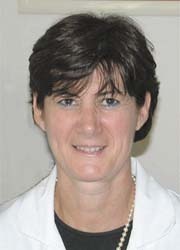"Choose, prioritise, compromise and juggle"
Professor Rémy-Jardin MD PhD heads the Department of Radiology and is Chairman of the Department of Thoracic Imaging at the Calmette Hospital, University Centre of Lille. She is also Professor of Radiology in Lille University's Medical Faculty.

The Calmette Hospital specialises in thoracic and respiratory medicine. In her department, Prof. Rémy-Jardin oversees five senior doctors and seven interns. Her international reputation and the quality of the department’s research attract radiologists from all over the world – the present senior staff includes doctors from South Africa, Canada and Italy, all at Lille to improve their knowledge in high-resolution computer tomography of diffuse infiltrative and vascular lung diseases; interventional vascular procedures; cardiac and pulmonary functional imaging, and reduction in radiation dose – the professor’s areas of expertise. Additionally, much of her published research is in spiral CT imaging, especially technical developments; post-processing; CT angiography and multi-detector CT, including dual energy.
Her university thoracic imagers and scanning research programme is based on a longstanding collaboration with Siemens: the centre serves as a reference site for the company, providing it with access to clinical activities through which clinical research can be undertaken. This research is then channelled into publication in international journals and/or presented at major conferences. It is also used for Siemens’ technological investigations. In return, the radiology department can propose the use of the latest scanners and imagers to patients — technology that most public hospitals only dream of buying.
In her private life, Prof. Rémy-Jardin is a wife and mother.
During a European Hospital interview we asked about her career as well as its effects on her private life:
What do you consider your major professional achievements among the many we can only briefly outline here?
R-J: To have become the Head of a Radiology Department in which it is possible to combine high-quality diagnostic activities, teaching and clinical research activities. This has been possible through the constant collaboration with the previous head of this department, Professor Rémy. Because he was nearing retirement age, he handed over the Radiology Department to concentrate on university research interests. Perhaps, due to my close personal involvement with him, I feel very keenly the challenge of keeping not only the same level of quality but also the overall vision for the department’s future.
How do you manage family time? Has being a mother compromised your career?
True, my work doesn’t leave me much free time, but I have a little boy who is my most important personal achievement. One has to make choices in life. I chose to commit time to bringing up my son. He is still only 10 years old.
I’ve been extraordinarily lucky in my professional life, because my husband is in the same profession, the same specialty and the same department — very lucky! There is probably only one thing I might have done differently if I’d been a man, or not had a family, and that is to have been more involved in the organisation and politics of our profession — another important aspect of radiology. Unfortunately, this isn’t something one can do without full-time commitment and it would involve a lot of time and travel. So my choice has been my son rather than professional politics. I don’t really have any regrets. I sometimes think about it, but if I can’t do something with 100% commitment I’d rather not do it. My son is far more important to me than this ‘missed’ opportunity.
Is it more difficult for women to be radiologists than men?
No, I think medicine is a pretty equal profession for both. I don’t think medicine itself makes differences; it is society and perhaps even nature. It is women who commit to the family, who make that extra time and, to do this, they must prioritise, compromise, juggle and eventually decide which the best path is for them. Again, my personal experience is probably very different from that of most women. I had my son late, at 41. My career was already established and, because I’m Head of Department, I can organise my working day without having to ask my boss’s permission. That’s not something someone 10 years more junior could do. I can arrange to leave early and work at home, so that when my son comes home from school we have time together. However, I’m often at the hospital at weekends, much to my son’s displeasure! If I employed someone to look after him, I could organise my day differently but that’s not what I want.
The same goes for choosing radiology; if you love it you should do it. As a specialty there are plenty of options. The hospital career path is probably the most challenging to balance with a family but, in a private radiology centre, a woman can happily work part time, fitting her professional life around her family.
What advice would you offer women in medicine or, specifically, radiology?
Women, particularly those in senior positions, have to impose some rules. Although we are just as efficient as men (if not more so) our time is more limited. So, if a half-hour meeting is scheduled for mid-day, it starts at mid-day; if people turn up at 12.15, it becomes a 15 minute meeting. Obviously, over time, I’ve become very diplomatic in the way I say this, but it is important. The time we have for work has to be used effectively. Women must be efficient and flexible with the time at their disposal and our male colleagues must learn to understand and respect this. We are not only doctors but also have other important commitments: husbands and children.
01.03.2008





